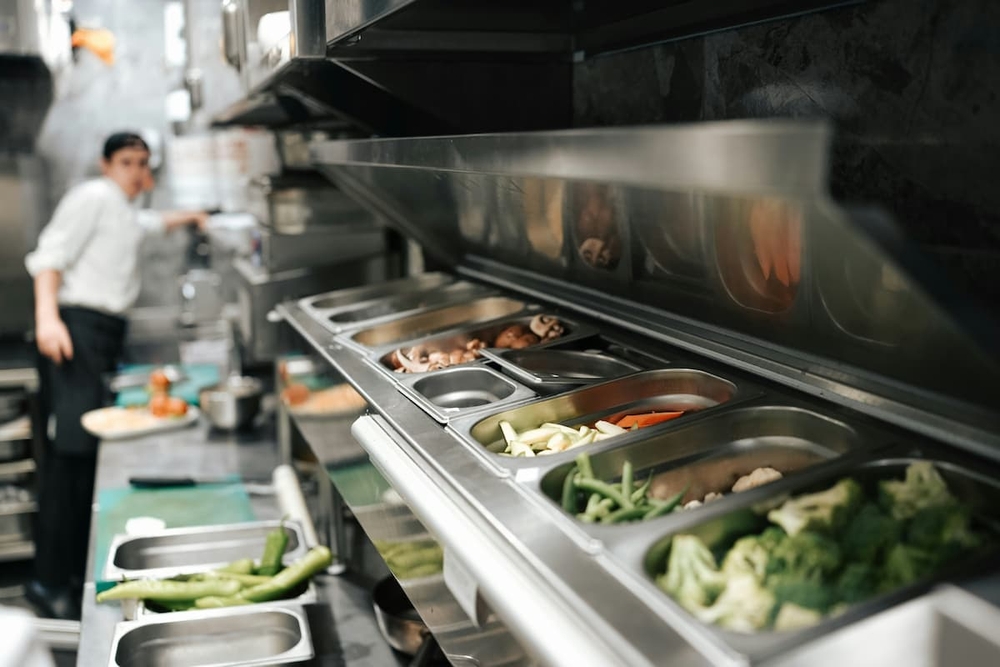Navigating Boston’s commercial kitchen requirements: a complete guide
Table of Contents
CloudKitchens
How many tacos can be delivered from a 1000sqft restaurant?
The same amount as a 200sqft ghost kitchen.
Boston is a vibrant culinary hub known for its innovation in food and hospitality. If you’re planning to start a food business in this city, understanding the commercial kitchen requirements is essential. Whether you’re opening a traditional restaurant, ghost kitchen, or catering operation, complying with the city’s health, zoning, and building codes is the first step to launching a successful venture.
Understanding the basics of commercial kitchen requirements
A commercial kitchen must meet local, state, and federal standards that regulate food safety, sanitation, and structural integrity. These requirements are enforced by various entities, including the Boston Inspectional Services Department (ISD), the Massachusetts Department of Public Health (MDPH), and the Fire Department.
The main categories of commercial kitchen’s requirements include:
- Kitchen size and layout;
- Ventilation and fire suppression;
- Plumbing and waste management;
- Food storage and handling;
- Equipment and appliances;
- Licenses and permits.
Disclaimer: These aren’t the only requirements. Additional rules may apply, and it’s the restaurant’s responsibility to check all local, state, and federal regulations to ensure full compliance.
What is the minimum size for a commercial kitchen?
There is no strict minimum square footage set by the city or state, but your kitchen must be large enough to operate safely and efficiently. Here are a few general considerations:
- Most commercial kitchens range from 200 to 2,000 square feet depending on the business model.
- Your kitchen layout must include separate zones for food preparation, cooking, dishwashing, and dry/cold storage.
- The Massachusetts Food Code requires adequate space to prevent cross-contamination and ensure employee safety.
Before signing a lease or starting a build-out, consult an architect familiar with commercial food service operations to ensure your design meets local guidelines.
Read more: Start a food delivery service: your complete how-to guide
Equipment requirements for Boston commercial kitchens
Boston’s guidelines emphasize using commercial-grade equipment that meets NSF (National Sanitation Foundation) standards. Essential equipment may include:
- Commercial ranges, ovens, and fryers with appropriate ventilation systems;
- NSF-certified refrigeration units for proper cold storage;
- Three-compartment sink for washing, rinsing, and sanitizing;
- Handwashing sinks in food prep and dishwashing areas;
- Commercial dishwashers or sanitizing systems;
- Fire suppression systems and exhaust hoods (approved by the Boston Fire Department);
- Grease traps for waste water management.
All equipment must be easy to clean and durable enough to withstand continuous use.
Plumbing, waste disposal, and ventilation standards
Plumbing and waste disposal systems must comply with the Massachusetts State Plumbing Code. Boston’s requirements include:
- A mop sink for janitorial use;
- Backflow prevention on all plumbing connections;
- Proper drainage and waste grease disposal.
Ventilation is another critical component. Your kitchen must have:
- Mechanical exhaust systems with hoods to remove smoke, grease, and heat;
- Make-up air systems to replace the exhausted air;
- Fire suppression systems installed within exhaust hoods (per fire safety code).
Proper ventilation and waste management help protect staff, prevent fires, and keep air quality within safe limits.
Storage and sanitation protocols
Storage must be well-organized and hygienic. Guidelines include:
- Separate dry and cold storage areas;
- Shelving at least 6 inches off the ground;
- Clear labeling and date-marking for food safety;
- Dedicated storage for cleaning supplies and chemicals away from food.
Sanitation standards require that:
- Cleaning schedules are posted and followed;
- Surfaces are made of non-porous, cleanable materials;
- Pest control measures are in place.
Read more: Kitchen Hygiene: rules and good practices to apply in your kitchen
Licensing and permitting in Boston
Operating a commercial kitchen in Boston requires several licenses and permits, including:
Food service permit
This is required by the Boston ISD. You’ll need to:
- Submit a floor plan for review;
- Complete a food safety plan;
- Undergo an inspection before opening.
Food establishment license
Granted by the Boston Public Health Commission. Requirements include:
- Certified Food Protection Manager (CFPM) on staff;
- Compliance with Massachusetts Food Code;
- Regular inspections.
Fire and building permits
If you’re installing cooking equipment, exhaust hoods, or remodeling a space, you’ll need permits from:
- Boston Fire Department;
- Boston Building Department.
Business license and EIN
You must register your business with the state and obtain an EIN (Employer Identification Number) from the IRS.
Food allergen awareness and choking prevention
Massachusetts requires at least one person per shift to have allergen awareness certification. Choking prevention posters must also be displayed in visible areas.
Read more: Optimizing your restaurant supply chain: cost-saving strategies without sacrificing quality
Space configurations and workflow optimization
Your kitchen layout must promote efficient workflow and minimize food safety risks. Common layouts include:
- Assembly line: Ideal for quick-service or high-volume kitchens
- Island layout: Centralized cooking area surrounded by prep stations
- Zone-style: Separate areas for each task (e.g., prep, cook, clean)
Each station should include the tools and equipment necessary to complete specific tasks, reducing cross-traffic and improving productivity.
ADA and accessibility compliance
Your commercial kitchen must meet the Americans with Disabilities Act (ADA) guidelines if it’s part of a public-facing business. Requirements include:
- Accessible entryways and pathways;
- Accessible restrooms;
- Proper height for counters and sinks.
Common pitfalls to avoid
Many operators face delays due to incomplete applications, failing inspections, or overlooking specific codes. Avoid these mistakes by:
- Consulting with local architects and kitchen consultants;
- Working closely with the Boston ISD and Fire Department;
- Scheduling pre-construction walkthroughs with city inspectors.
Read more: Ghost Kitchens: everything you need to know before starting
How CloudKitchens simplifies commercial kitchen compliance in Boston
Navigating Boston’s complex commercial kitchen requirements can be time-consuming and costly. That’s where CloudKitchens comes in. Our fully equipped commercial kitchen spaces in Boston are built to meet all local codes and regulations.
Ready to launch your compliant commercial kitchen in Boston? Get started with CloudKitchens today and bring your food concept to life, without the headaches.
DISCLAIMER: This information is provided for general informational purposes only and the content does not constitute an endorsement. CloudKitchens does not warrant the accuracy or completeness of any information, text, images/graphics, links, or other content contained within the blog content. We recommend that you consult with financial, legal, and business professionals for advice specific to your situation.
More insights & stories
There’s more where that came from.
Get in the know and check out our additional insights


